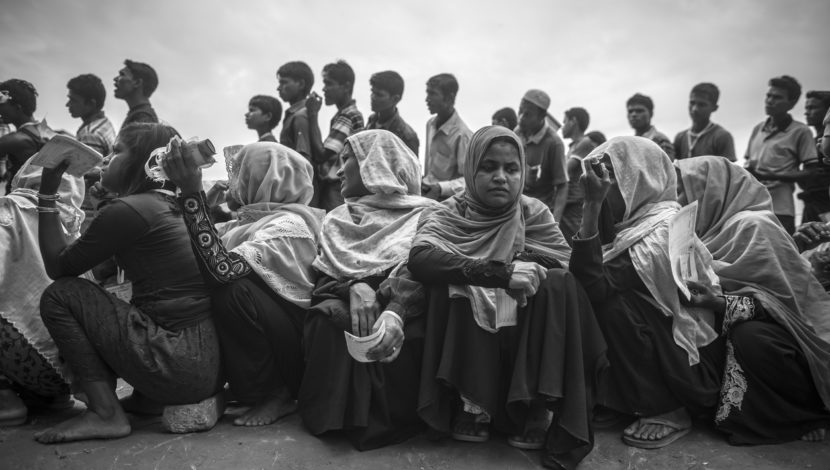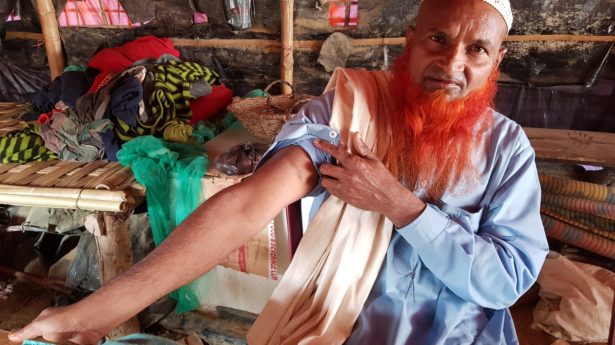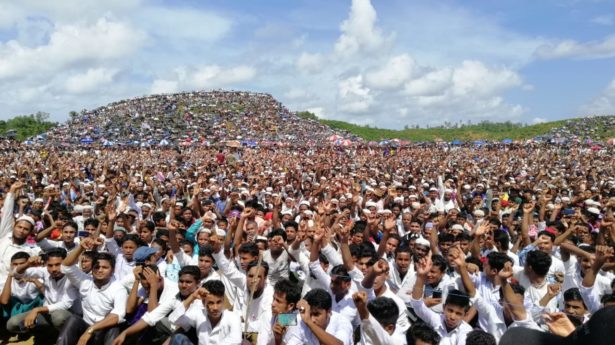The Unitarian Universalist Service Committee advances human rights through grassroots collaborations.
A Growing Movement for Justice and Accountability for the Rohingya Genocide

By UUSC Staff on December 16, 2019
Last week marked what could arguably be deemed one of the most exciting and historic weeks for both Burma (Myanmar) as well as the broader fields of international justice and human rights. Nobel Laureate and State Counsellor Aung San Suu Kyi, in what many have called a fall from grace and loss of iconic stature, defended Burma against state culpability for genocide at the International Court of Justice (ICJ), the world’s highest court based in The Hague. The historic case, claiming Burma’s failure to uphold its state obligations mandated under the 1948 Genocide Convention, was filed by The Gambia with support from the member states of the Organization for Islamic Cooperation (OIC) as well as Canada and the Netherlands. Such coalitions represent a rare united front for the moral responsibility to publicly acknowledge and hold accountable states that perpetrate and fail to prevent genocide, crimes against humanity, and war crimes.
Although the ICJ’s determination of Burma’s state responsibility for genocide could take years, last week’s public hearing was a first step to convince the court of both its jurisdiction in the case as well as to require the Burmese government and military to take provisional measures to immediately halt its ongoing genocidal violence and policies against Rohingya communities still languishing in the country and for the more than one million wishing to return home from refugee camps in Bangladesh. Perhaps most importantly, the proceedings were a very public showcase that exposed the truth of the genocidal violence perpetrated against the Rohingya—well documented by United Nations and various other international investigative bodies—in the face of ongoing and bewildering denials by Aung San Suu Kyi’s government and the Burmese State.
It is also noteworthy to highlight that the ICJ case is only assessing state responsibility for genocide and not individual criminal responsibility of perpetrators. However, separate efforts are underway to hold individual military perpetrators accountable through unprecedented proceedings at the International Criminal Court (ICC), where the prosecutor has been granted authorization to begin an investigation on the crime against humanity of deportation, as well as in Argentina, where a Rohingya human rights activist in partnership with Argentinian civil society has filed a Universal Jurisdiction (UJ) case naming specific military generals and Aung San Suu Kyi herself, responsible for committing genocide against the Rohingya. In addition, the U.S. Treasury on December 10—International Human Rights Day—issued targeted economic sanctions on four of Burma’s top military generals, including Commander-in-Chief Min Aung Hlaing. These economic sanctions, though not yet covering military-owned businesses and other economic interests, build upon visa bans and travel sanctions issued by the United States earlier in the year.
Perhaps the most important outcome of these international legal proceedings thus far has been the outpouring of support and solidarity shown by allies from Burma and across the world. For so many years, the Rohingya have suffered in the face of persecution and anti-Muslim discrimination that permeates Burmese society across all ethnic groups. Exclusion of and hatred towards the Rohingya community has long been one of the few common rallying calls across many of the divided factions in Burmese society. However, in recent weeks and months, there has emerged a growing chorus of support and solidarity from both brave individuals and prominent ethnic minority leaders from Karen, Shan, Kachin, and even Rakhine communities. The struggle for justice for the Rohingya has rightly been compared to that of their fellow ethnic brothers and sisters, and many ethnic minorities are beginning to see that justice for the Rohingya—who have suffered from a similar systematic, intentional, and decades-long campaign of human rights abuses, violence, and trauma—could also represent justice for their own ethnic communities.
Given the elite-driven nature of international justice processes, UUSC engages on the issue by using the space created to support and cultivate this grassroots solidarity. Since the international community took on the Burmese human rights and democracy struggle as a cause célèbre in the late 1980s, it has been grassroots civil society groups that have been at the forefront of human rights documentation and international advocacy that ultimately led to the creation of the United Nations human rights mechanisms and international justice processes we see today. Through its grantmaking program, direct technical support, advocacy, and donor coordination, UUSC aims to work with and further develop the leadership of Rohingya leaders, build the organizational capacity of Rohingya civil society organizations, and create spaces for alliance-building and dialogue. Timing is critical for the mobilization of grassroots communities on justice and human rights issues, and it remains a moral imperative to ensure that the international community not only supports high level justice processes, but also locally led, transformative justice and community development measures that build and restore a sense of dignity and ownership directly to Rohingya communities themselves.
Photo Credit: iStock – Joel Carillet
***
About UUSC: Guided by the belief that all people have inherent worth and dignity, UUSC advances human rights globally by partnering with affected communities who are confronting injustice, mobilizing to challenge oppressive systems, and inspiring and sustaining spiritually grounded activism for justice. We invite you to join us in this journey toward realizing a better future!

